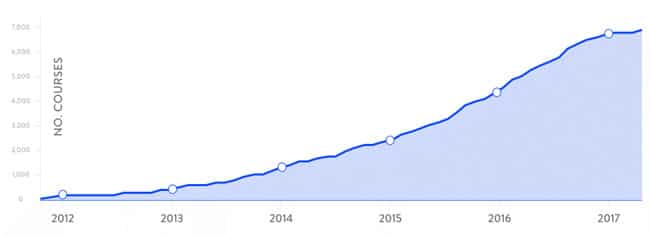Global MOOC enrolment jumped again last year
Student enrolment in MOOCs (Massive Open Online Courses) has been growing at an especially fast clip over the last few years and that pace barely slowed in 2016. The latest figures from Class Central, an aggregator of MOOC course listings, indicate that 58 million students signed up for at least one course in 2016. This represents a nearly two-thirds increase over the 35 million registered students in 2015, which was in turn a doubling over the enrolment base from 2014.
Helping to fuel this growth, the number of courses on offer continues to climb quickly as well. There were 2,600 new courses announced in 2016 (up from 1,800 the previous year), bringing the worldwide total to nearly 7,000 online courses offered by 700 universities.

- A move to self-pace learning. Class Central points out as well that, rather than being offered just once or twice a year, many online MOOCs are now offered as self-paced courses with new sessions often beginning monthly or even bi-weekly. “This switch has led to a significant increase in the number of courses students can register for and start almost immediately,” notes the report. “This means that instead of tens of thousands of people learning together, many students are learning at their own pace and in much smaller cohorts.”
- A continuing emphasis on monetising MOOC studies, both in terms of the expansion of fee-based programmes but also the decline of so-called stand-alone courses. Rather than such one-off courses, providers are more focused this year on offerings tied to MOOC certificates or other credentials.
Class Central founder Dhawal Shah adds, "The range of features and experiences that were once free have dramatically shrunk over the last couple years, raising the question of how ‘open’ MOOCs truly are. Taking the course simultaneously with thousands of learners is no longer a selling point of MOOCs (from a course providers perspective). There’s been a decisive shift to focus on ‘professional’ learners who are taking these courses for career-related outcomes, over the dabblers and lifelong learners who take courses just for curiosity’s sake." Overall, the picture for 2016 (and into 2017) is of a rapidly expanding enrolment base for online learning, and of courses that are neither as massive nor as open as they were even a couple of years ago. These trends align in turn with a growing emphasis in international education on exporting education services via distance or distributed learning on the part of such leading destinations as the UK or Australia.














